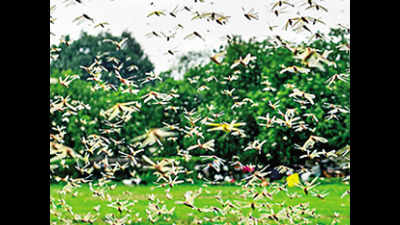- News
- City News
- patna News
- Locust attack: Bihar government puts ten districts in ‘danger zone’
Trending
This story is from June 30, 2020
Locust attack: Bihar government puts ten districts in ‘danger zone’

Locusts were seen in groups but in small numbers in some districts
PATNA: State agriculture minister Prem Kumar on Monday issued an advisory for those living in towns with regard to preventive measures, besides grading all the 38 districts in three categories in the order of their vulnerability to locust attack.
The agriculture department has put 10 districts in the ‘danger zone’ and another 10 in the vulnerable zone painted green on the map where people have to remain alert.The remaining 18 districts have been put in the pink zone, meaning that they would largely remain free of locust menace.
The districts in the danger zone are Patna, Bhojpur, Rohtas, Kaimur, Jehanabad, Arwal, Aurangabad, Saran, East Champaran and West Champaran. The 10 other districts in green zone are Nalanda, Buxar, Gaya, Nawada, Siwan, Gopalganj, Muzaffarpur, Sitamarhi, Sheohar and Vaishali.
Prem said locusts were seen in groups but in small numbers in East Champaran, West Champaran, Muzaffarpur, Bhojpur, Patna, Jehanabad, Nalanda and Nawada districts. The locusts entered Masaurhi in Patna district from Bhojpur via Bikram and Paliganj blocks, but then turned towards Nalanda and Nawada. Similarly, they were also sighted on the outskirts of Bagaha Nagar Parishad area in West Champaran, besides in Nautan and Piprasi blocks of the district.
As to the advisory for people in the towns, as and when they sight locusts, they should gather around and stand in groups on rooftops and beat drums, nagara, tin cans, plates and even ring bells to create loud noise, Prem said.
He also advised people to burn ‘gugool’ in their rooms and spray menthol oil in houses and on the railings, besides covering flower pots and kitchen garden with jute sacks to prevent locusts from seeing and perching on them.
The minister said the farmers should apply the traditional methods to create noise to drive away the locusts, besides spraying pesticides on their crops, like paddy seedlings. He, however, said the locusts have not yet caused any damage to the crops in any district where they have been sighted due to alertness of the farmers, government officials and others concerned.
The agriculture department has put 10 districts in the ‘danger zone’ and another 10 in the vulnerable zone painted green on the map where people have to remain alert.The remaining 18 districts have been put in the pink zone, meaning that they would largely remain free of locust menace.
The districts in the danger zone are Patna, Bhojpur, Rohtas, Kaimur, Jehanabad, Arwal, Aurangabad, Saran, East Champaran and West Champaran. The 10 other districts in green zone are Nalanda, Buxar, Gaya, Nawada, Siwan, Gopalganj, Muzaffarpur, Sitamarhi, Sheohar and Vaishali.
Prem said locusts were seen in groups but in small numbers in East Champaran, West Champaran, Muzaffarpur, Bhojpur, Patna, Jehanabad, Nalanda and Nawada districts. The locusts entered Masaurhi in Patna district from Bhojpur via Bikram and Paliganj blocks, but then turned towards Nalanda and Nawada. Similarly, they were also sighted on the outskirts of Bagaha Nagar Parishad area in West Champaran, besides in Nautan and Piprasi blocks of the district.
The strength of locust swarms was in the range of 10,000-15,000 in West Champaran, while the general strength of their groups sighted in various districts has been in the range of 5,000 to 60,000 in one group, the minister said, adding that overall around 2.5 lakh locust swarms were flying in the state.
As to the advisory for people in the towns, as and when they sight locusts, they should gather around and stand in groups on rooftops and beat drums, nagara, tin cans, plates and even ring bells to create loud noise, Prem said.
He also advised people to burn ‘gugool’ in their rooms and spray menthol oil in houses and on the railings, besides covering flower pots and kitchen garden with jute sacks to prevent locusts from seeing and perching on them.
The minister said the farmers should apply the traditional methods to create noise to drive away the locusts, besides spraying pesticides on their crops, like paddy seedlings. He, however, said the locusts have not yet caused any damage to the crops in any district where they have been sighted due to alertness of the farmers, government officials and others concerned.
End of Article
FOLLOW US ON SOCIAL MEDIA










